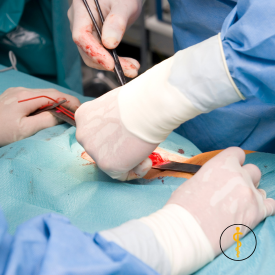Laparoscopic Hernia Surgery

Hernia surgery, also known as herniorrhaphy/plasty, is the most common treatment for a hernia. A hernia occurs when an organ pushes through a muscle or tissue wall that holds it in place, usually in the abdomen or groin. During hernia surgery, the displaced organ or tissue is pushed back into place, and the muscle or tissue wall is strengthened using stitches or a surgical mesh to prevent future herniation.
While not all hernias require immediate intervention, most eventually need treatment as they tend to worsen over time. Hernias create visible bulges as interior tissues press through a tear in the muscle wall, potentially causing discomfort or pain. Hernias can also lead to more severe complications if untreated, especially if they affect nearby organs. For example, in men, a hernia can slip into the scrotum, causing swelling, pain, and other issues. If symptoms become problematic or there’s a risk of complications, surgery is typically recommended.
Hernia repair surgeries generally fall into three categories:
The surgeon makes a large incision to access the hernia, reposition the tissues, and stitch the muscle wall. Often, surgical mesh is used to reinforce the tissue.
This minimally invasive option uses small incisions and a laparoscope (a tiny camera) to guide the repair. The surgeon uses specialized instruments to complete the procedure with minimal scarring.
This is a more advanced form of laparoscopic surgery, where the surgeon operates using robotic instruments for precision. The surgeon controls the robotic arms through a console, offering greater dexterity for intricate repairs.
Hernia surgery is a very common procedure, with over 1 million surgeries performed annually in India and around 20 million globally. The most frequently treated type is inguinal hernia, occurring in the groin. The second most common type is umbilical/ventral hernia.
Before surgery, Dr. Mohit Agrawal will review your medical history and conduct any necessary tests to ensure you are a suitable candidate. Preparation may include:
The surgical process will depend on whether you are undergoing open, laparoscopic, or robotic surgery. The general steps include:
The length of hernia surgery can vary. Simple repairs may take 30-60 minutes, while more complex cases can last several hours. Robotic procedures tend to take longer than open or laparoscopic ones.
You won’t feel pain during the surgery itself due to anesthesia. Afterward, your healthcare provider will manage your pain with medication, which may be needed for several days or weeks post-surgery.
Most hernia surgeries are outpatient, meaning you can return home the same day. More complicated cases may require an overnight hospital stay. You should rest for at least 24 hours post-surgery, though light activities like walking can be resumed the next day. Dr. Agrawal will provide guidance on when you can resume normal activities, depending on the type of surgery and your overall health.
Hernia surgery is generally safe and highly effective at preventing hernias from recurring. Only about 16% of hernias return within 10 years of surgery. Laparoscopic and robotic procedures tend to result in less scarring, faster recovery times, and a lower need for pain medications compared to open surgery.
While hernia surgery is safe, there are risks associated with any surgery. Short-term complications may include:
Most patients return to non-physical jobs within a few days, while those with physically demanding jobs may need to wait several weeks. Light exercise is encouraged after the first day, but more intense activities should be reintroduced gradually.
Following surgery, monitor for potential complications. You should call your healthcare provider if you experience:
In case of emergency symptoms such as difficulty breathing or signs of sepsis (fever, rapid heart rate, sweating), seek immediate medical attention.
Dr. Mohit Agrawal is an experienced laparoscopic surgeon with extensive expertise in hernia repair procedures. He specializes in minimally invasive techniques, ensuring his patients experience faster recovery times and reduced post-surgical discomfort.
Ready to take the next step towards expert and personalized care for Laparoscopic Hernia Surgery?
Contact us today to schedule your consultation. Our experienced Laparoscopic Hernia Surgery team is here to provide expert guidance and ensure your comfort throughout the process.